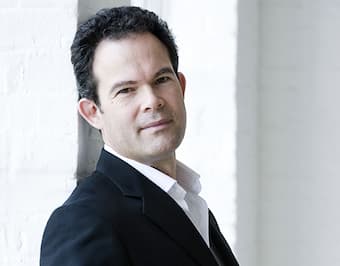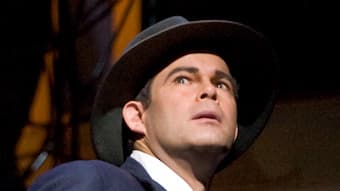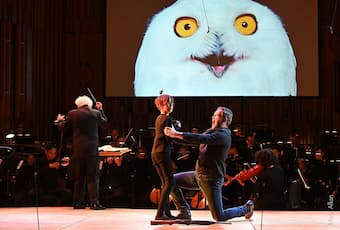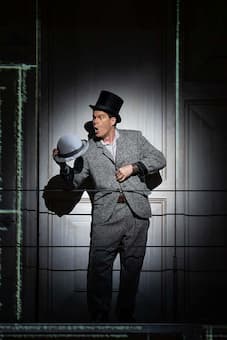
Gerald Finley © Sim Canetty-Clarke
Canadian bass-baritone Gerald Finley is widely acclaimed as “one of the classical music world’s great communicators.” Having exceptional control and command over a wide variety of repertoire, Finley is one of the premiere dramatic interpreters of our time. In fact, his emotional interpretations, stagecraft, and superlative dramatic and comedic instincts have garnered Finley universal praise. Equally at home on the most prestigious operatic stages and concert venues, Finley has collaborated with the greatest composers, orchestras and conductors in music covering the entire spectrum of vocal art.

Gerald Finley in John Adams’ Dr. Atomic
His operatic, orchestral, and song interpretations have been recorded on CD and DVD with major labels, and he has received a Grammy Award for his portrayal of J. Robert Oppenheimer in John Adams’ Doctor Atomic. Among additional contemporary roles created for Finley, we also find “Harry Heegan” in Mark-Anthony Turnage’s The Silver Tassie, and the title character in Tobias Picker’s Fantastic Mr. Fox.
Gerald Finley: Doctor Atomic “Batter my Heart”

© Mark Allen
Gerald Finley was born on 30 January 1960 in Montreal, and began singing as a chorister at St. Matthew’s Anglican Church in Ottawa under Brian Law. Additionally, he joined the Ottawa Choral Society, and the National Arts Centre chorus. He briefly enrolled in the music program at the University of Ottawa, but encouraged by his great-uncle Sir William McKie, former organist at Westminster Abbey, Finley moved to England in 1979. He continued his studies at King’s College at Cambridge University, and at the Royal College of Music in London. He sang with the Cambridge Singers, and during the early years of his career joined the chorus of Glyndebourne Opera in 1986. Graduating to small roles by 1988, he moved to opera studies at England’s National Opera Studio. After studies with Armen Boyajian in New York, he won the John Christie award and gave his debut as “Sid” in Britten’s Albert Herring. Roger Norrington cast him as “Papageno” in a production of Die Zauberflöte in 1989 and 1990, and Finley toured in that role with the Glyndebourne Company. His initial career closely focused on the music of Mozart, and Finley made his name in all the Mozart baritone roles. His interpretations of Don Giovanni and the Count in Le nozze di Figaro have been heard live recorded and broadcast throughout the world.
Gerald Finley/Kate Royal: Don Giovanni “La ci darme la mano”

Gerald Finley in Mozart’s Don Giovanni
(Royal Opera House) © Bill Cooper
Finley’s meteoric rise saw him debut at major opera houses around the world while he expanded his repertoire to include what are now considered his signature roles as “Bluebeard” and “Guillaume Tell.” However, Finley also kept his finger on the pulse of the time as he sang the role of “Jaufré Rudel” in Kaija Saariaho’s L’amour de loin at its premiere at the Salzburg Festival in 2000. As his voice deepened in middle age, Finley expanded his repertory into Tchaikovsky, Wagner, and Verdi. He played “Hans Sachs” in Die Meistersinger at the Glyndebourne Opera in 2011, and at l’Opéra de Paris, “Amfortas” in Parsifal at Royal Opera Covent Garden, “Wolfram” at the Lyric Opera of Chicago, Verdi’s Falstaff at the Canadian Opera (for which he won a DORA Award), and a peerless “Iago” in Otello with Sir Colin Davis and the LSO. Just as importantly, Finley’s concert work is a vital part of his flourishing career. He has appeared with the most prestigious orchestras, and the rediscovered version of Shostakovich’s “English Poets” along with that composer’s orchestral cycle, “Michelangelo Sonnets,” was recorded by Finley and the Helsinki Philharmonic on the Ondine label and received international critical acclaim.
Gerald Finley: Otello “Iago’s Credo”

Gerald Finley and Julius Drake
Gerald Finley is a celebrated song recitalist, who regularly works with pianist Julius Drake. Performances of Britten, Duparc, Ives, Liszt, Ravel, Schumann, Brahms, and Schubert have been described as “incredibly attentive and sensitive to sound. Their interpretations avoid extremes and rely on naturalness, smoothing out the thorny existential sentiments in favor of sensitive and lyrical interpretations.”

© Clive Barda
Possibly his most acclaimed recording is of the Songs by Samuel Barber, on Hyperion, which won a Classic FM Gramophone Award in 2008 as Best Solo Vocal Recording. As part of his dedication to preserving and enhancing the singing tradition, Finley gives master classes throughout the world, most recently at the Juilliard School of Music. He also continues to work with the Jette Parker Young Artists’ Program at the Royal Opera, Covent Garden, the National Opera Studio, and the Lindemann Program at the Met. Finley is Fellow and Visiting Professor at the Royal College of Music, and he was appointed Commander of the Order of the British Empire in 2017.
For more of the best in classical music, sign up to our E-Newsletter
Gerald Finley/Julius Drake: Die schöne Müllerin “Das Wandern”
